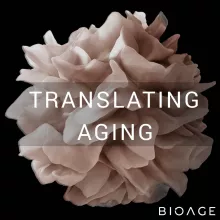Episode shownotes
Today’s guest is Dr. Morgan Levine, an assistant professor of Pathology and Epidemiology at Yale School of Medicine. She is also a Founding Principal Investigator at Altos, a new biotechnology company focused on cellular rejuvenation programming to restore cell health and resilience. Dr. Levine shares her expertise on biological aging, aging clocks, cellular reprogramming, and a peek into the research she’s currently undertaking at Altos here today.
She starts the conversation by explaining the differences between biological aging and chronological aging. She then delves into topics surrounding biological clocks such as DNA methylation, and discusses her work at Altos and how this will differ from an academic environment. Dr. Levine finishes up by highlighting what Altos hopes to bring to science and biotech in years to come.
In today’s episode, you’ll learn the difference between biological and chronological aging, the nature of biological clocks, and some of the exciting work taking place in biotechnology these days.
Episode Highlights:
- The difference between chronological aging and biological aging
- What is an epigenome?
- How DNA methylation is measured
- Using aging clocks for a particular demographics
- How to decide if a discovery slows the biological clock
- Applications of clocks as it pertains to aging and longevity
- The costs of individual measurements
- Dr. Morgan’s work at Altos
- How Altos was founded
- Deciding the direction of research
- Understanding cellular reprogramming
- The future at Altos
Quotes:
“Age measured in chronological time was the biggest risk factor for most diseases.”
“I like to think of the epigenome as almost the operating system of a cell.”
“The things that we assume should affect aging, in potentially an animal model, show effects when using the epigenetic clock.”
“We've actually taken the human epigenetic clock and broken them out into.. what we would call different modules.”
“If we're measuring biological age, it should first correlate with chronological age to some degree, but not perfectly.”
“We’ve become much more interested in understanding the clocks rather than developing new clocks… What’s driving the changes that are captured by the clocks, and how do those link to the outcomes they’re associated with?”
“My lab is really a combination of both experimental wet lab people and computational dry lab people.”
“I think saying we just work on aging, or just work on longevity, is really constraining us to some degree.”
Links:
Email questions, comments, and feedback to podcast@bioagelabs.com
Translating Aging on Twitter: @bioagepodcast
BIOAGE Labs Website BIOAGELabs.com
BIOAGE Labs Twitter @bioagelabs
BIOAGE Labs LinkedIn
Dr. Morgan’s LinkedIn
Altos Labs Website
